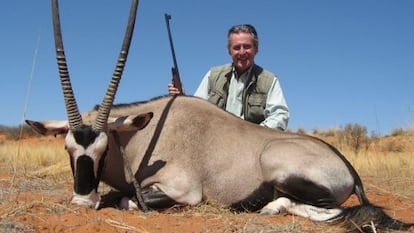Caja Madrid chairman spent €10,000 on wine with company credit card
New details of undeclared purchases and cash withdrawals by bank executives emerges


Further details have emerged about the €15.5 billion in company funds spent by members of the board of directors at the Caja Madrid savings bank using undeclared credit cards between 2003 and 2012.
A breakdown of the credit card accounts seen by EL PAÍS shows that Miguel Blesa, the former chairman of Caja Madrid, spent more than €10,000 alone on wine, and that in 2008 he used the card to pay for a €9,000 vacation to South Africa.
He also ran up bills of €2,000 on watches and meals at upscale restaurants. In total, Blesa spent €436,000 using company credit cards, around €54,600 a year, according to bank documents. He is now the target of an investigation into mismanagement at the bank during his tenure as chairman, a post for which he was paid €3.5 million a year.
Blesa, 65, was appointed chairman of Caja Madrid in 1997, during the Popular Party’s first of two consecutive terms in office. A lawyer, Blesa never concealed the fact that his close friendship with the then-prime minister, José María Aznar, was a key factor in his appointment to head Spain’s second-largest savings bank, with €190 billion in assets.
His mission was to double the bank’s balance, grow across Spain, and expand the size of a three-centuries-old institution. He wanted to open up new branches, hire more staff and boost profits. In an interview with EL PAÍS in May 1997, Blesa rejected the idea of growing slowly.
In total, Blesa spent €436,000 using company credit cards, around €54,600 a year
Among Blesa’s first initiatives when he took over the chairmanship of the bank was to increase his salary and those of other board members: he made €12.44 million alone between 2007 and January 2010. His closest aides made between €2 and €9.7 million over the same period of time. The Bank of Spain asked for reports but placed no limits on wages.
Blesa was not alone in his lavish use of company credit cards. According to Caja Madrid’s accounts, Estanislao Rodríguez-Ponga, a former PP secretary of state for finance, and a board member of Caja Madrid, spent €255,400 on vacations, expensive meals and stays in luxury hotels, much of it through the El Corte Inglés department store, where he now sits on the board of directors.
Similarly, Elena Gil, the former head of Corporación Financiera Caja Madrid, the holding company used by the bank for its business interests, spent €9,000 on jewelry, while Rodrigo Rato, who succeeded Blesa as chairman, spent €99,000 on restaurants, hotels and trips. He has since returned €54,837 of that amount.
Among Blesa’s first initiatives when he took over the chairmanship of the bank was to increase his salary
Francisco Baquero, appointed to the board of Caja Madrid by the CCOO labor union, spent €266,400 on meals and furniture.
Some senior members of the board of directors attempted to cover their tracks by simply withdrawing cash from the bank, among them José Antonio Moral Santín of the United Left party, who withdrew around €365,000 in this way. He has since been expelled from his party.
Ricardo Morado, the former director general of Caja Madrid, withdrew €360,000 in cash. He now works for Santander Bank.
Other political appointees to the board also withdrew smaller sums, among them Antonio Romero amd José Caballero Domínguez of the Socialist Party, Francisco Moure and Rafael Pradillo.
Some senior members of the board attempted to cover their tracks by simply withdrawing cash
Blesa is also under judicial investigation in relation to Caja Madrid's controversial, loss-making acquisition of City National Bank of Florida in 2008, and for allegedly giving preferential terms on loans to a fellow member of the Caja Madrid board of directors.
He and board members are also being investigated over the sale of billions of euros in risky investments to small savers known as preference shares, sold as part of efforts to boost the bank's capital and cover up solvency problems.
Some 300,000 clients of Caja Madrid and another lender Bancaja lost their savings in the preference shares debacle. Bancaja and Caja Madrid were merged in 2010 with five other savings banks to form Bankia, which became Spain's biggest bailed-out bank.
Tu suscripción se está usando en otro dispositivo
¿Quieres añadir otro usuario a tu suscripción?
Si continúas leyendo en este dispositivo, no se podrá leer en el otro.
FlechaTu suscripción se está usando en otro dispositivo y solo puedes acceder a EL PAÍS desde un dispositivo a la vez.
Si quieres compartir tu cuenta, cambia tu suscripción a la modalidad Premium, así podrás añadir otro usuario. Cada uno accederá con su propia cuenta de email, lo que os permitirá personalizar vuestra experiencia en EL PAÍS.
En el caso de no saber quién está usando tu cuenta, te recomendamos cambiar tu contraseña aquí.
Si decides continuar compartiendo tu cuenta, este mensaje se mostrará en tu dispositivo y en el de la otra persona que está usando tu cuenta de forma indefinida, afectando a tu experiencia de lectura. Puedes consultar aquí los términos y condiciones de la suscripción digital.








































